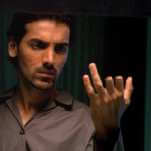William Peter Blatty doesn’t fuck around. Best known for his 1971 novel The Exorcist (source of the 1973 film), Blatty writes, directs, and produces stories that wrestle with religion, quantum physics, the often-bleak nature of human existence, and some pretty awful jokes. He isn’t a great artist; his prose is overwrought and often hilariously clunky (“The genial and diminutive Armenian Prelate’s wily little eyes held a mischievous glitter”), and his grim single-mindedness often translates into a tone-deaf mixture of violence and bad comedy. But he’s an undeniably singular writer, and his work is compelling and thought-provoking for those who can get beyond its pulpy absurdities. Dimiter, Blatty’s newest book, is in his usual style, with thick melodrama and a plot that verges on profundity before settling on some simple, almost mundane truths.
The novel’s plot doesn’t become entirely clear until the final 20 pages. Before that, there’s a great deal of incident with a large cast, connected by implication and a tenuous investigation into the nature of God and evil. In 1973 Albania, a nameless prisoner is arrested by authorities and put through horrific torture, but he refuses to reveal his name or purpose. A year later in Jerusalem, a doctor contemplates a series of seemingly mystical occurrences at his hospital, while his police-detective friend still mourns the deaths of his wife and son. All three are brought together by a mystery involving murder, international intrigue, and Christian belief.
Blatty’s greatest strength has also always been his most mockable weakness: his complete, unabashed sincerity. Dimiter is so unhampered by the agonies of irony and self-awareness that it’s occasionally impossible to read with a straight face, as characters dream deep symbols and one-liners are delivered with the force of prophecy. And yet that same unwinking intensity gives the story its power. Never boring even at its most florid, the novel is ridiculous yet moving, a parable about suffering and belief that never entirely achieves the transcendence it strives for. Blatty’s work isn’t for everyone, and those not enamored of his idiosyncrasies won’t find anything new here. Dimiter’s success is that it’s nothing less than the exact sum of its parts, a modestly gripping read with enough good fortune to be ignorant about its irrelevance.







































